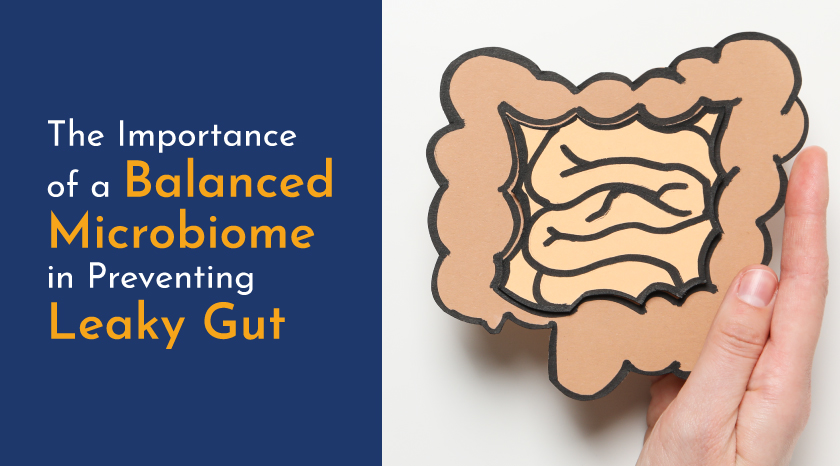Maintaining a healthy gut is crucial for overall well-being, as it plays a key role in digestion, immunity, and even mental health. A balanced microbiome— the community of trillions of microorganisms living in your digestive tract— is essential for keeping the gut barrier intact and preventing leaky gut syndrome. In this blog, we will explore the importance of a balanced microbiome and how it helps prevent leaky gut, along with practical tips to support gut health.
Understanding Leaky Gut Syndrome
Leaky gut syndrome, or increased intestinal permeability, occurs when the lining of the small intestine becomes damaged, allowing undigested food particles, toxins, and bacteria to “leak” through the intestinal wall into the bloodstream. This can trigger inflammation and an immune response, leading to a range of health issues, including:
- Digestive problems (bloating, gas, diarrhea, or constipation)
- Food sensitivities and allergies
- Chronic fatigue
- Joint pain and inflammation
- Skin issues (acne, eczema, or rashes)
- Autoimmune conditions
The Role of the Microbiome
The gut microbiome is composed of beneficial bacteria that play a crucial role in maintaining the integrity of the intestinal lining and overall gut health. A balanced microbiome contributes to:
- Strengthening the Gut Barrier: Beneficial bacteria help maintain tight junctions in the gut lining, preventing harmful substances from passing through.
- Regulating Inflammation: A healthy microbiome modulates the immune response and reduces inflammation, which is essential for preventing and managing leaky gut.
- Digesting Food and Absorbing Nutrients: Good bacteria aid in the digestion of food and absorption of nutrients, ensuring that your body gets the necessary building blocks for maintaining gut health.
- Producing Short-Chain Fatty Acids (SCFAs): Beneficial bacteria ferment dietary fibers to produce SCFAs like butyrate, which nourish the gut lining and support its integrity.
- Detoxifying Harmful Compounds: A balanced microbiome helps neutralize and eliminate toxins and pathogens that could otherwise damage the gut lining.
Causes of Microbiome Imbalance
Several factors can disrupt the balance of the gut microbiome, leading to an overgrowth of harmful bacteria and increased intestinal permeability. These include:
- Poor diet (high in processed foods, sugar, and unhealthy fats)
- Chronic stress
- Antibiotic use
- Lack of sleep
- Excessive alcohol consumption
- Sedentary lifestyle
How to Support a Balanced Microbiome
Maintaining a balanced microbiome is key to preventing leaky gut and promoting overall health. Here are some practical tips to support your gut microbiome:
- Eat a Diverse Diet: Incorporate a variety of fruits, vegetables, whole grains, legumes, nuts, and seeds into your diet to provide a wide range of nutrients and fibers that feed beneficial bacteria.
- Include Fermented Foods: Foods like yogurt, kefir, sauerkraut, kimchi, and kombucha are rich in probiotics that can help replenish and support a healthy microbiome.
- Limit Processed Foods and Sugar: Reduce your intake of processed foods, sugar, and artificial sweeteners, which can promote the growth of harmful bacteria.
- Stay Hydrated: Drink plenty of water throughout the day to support digestion and the health of the gut lining.
- Manage Stress: Practice stress-reducing activities such as yoga, meditation, deep breathing, or spending time in nature to help maintain a balanced microbiome.
- Get Enough Sleep: Aim for 7-9 hours of quality sleep each night to support overall health and gut function.
- Exercise Regularly: Regular physical activity promotes healthy digestion and can positively influence the composition of the gut microbiome.
- Consider Probiotic and Prebiotic Supplements: Probiotic supplements can introduce beneficial bacteria into your gut, while prebiotic supplements provide the necessary fibers that feed these good bacteria.
A balanced microbiome is essential for preventing leaky gut and promoting overall health. By supporting the growth and diversity of beneficial bacteria in your gut, you can strengthen the intestinal barrier, regulate inflammation, and improve digestion and nutrient absorption. Incorporating a variety of whole foods, managing stress, staying hydrated, and considering probiotic and prebiotic supplements are practical steps you can take to maintain a healthy microbiome.
For high-quality probiotic and prebiotic supplements that support gut health, visit Biom Probiotics. Invest in your gut health today and enjoy the benefits of a balanced microbiome and a healthier, more resilient gut.





